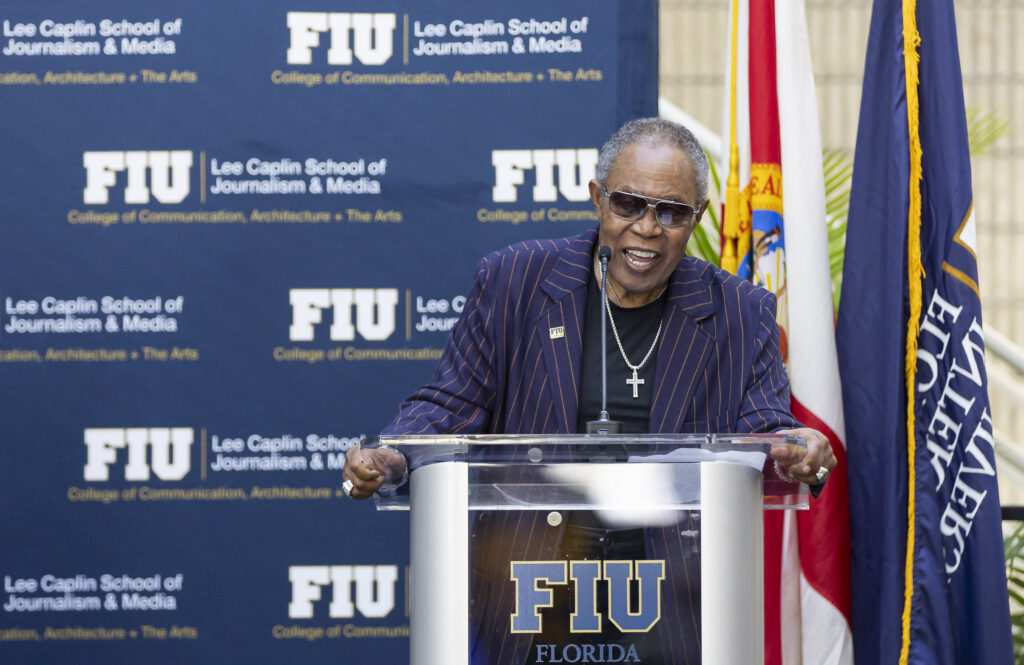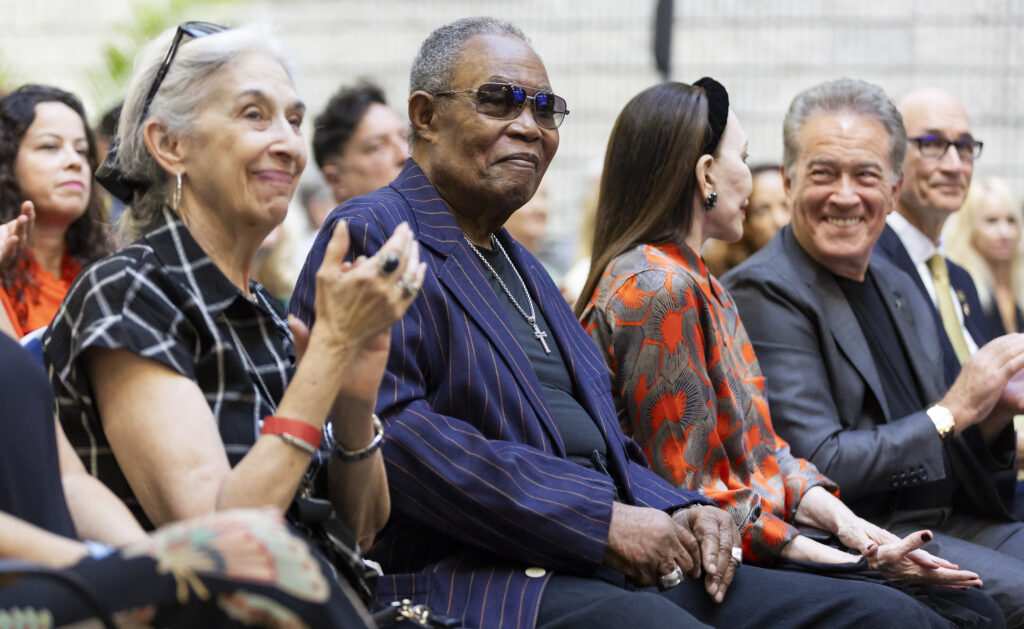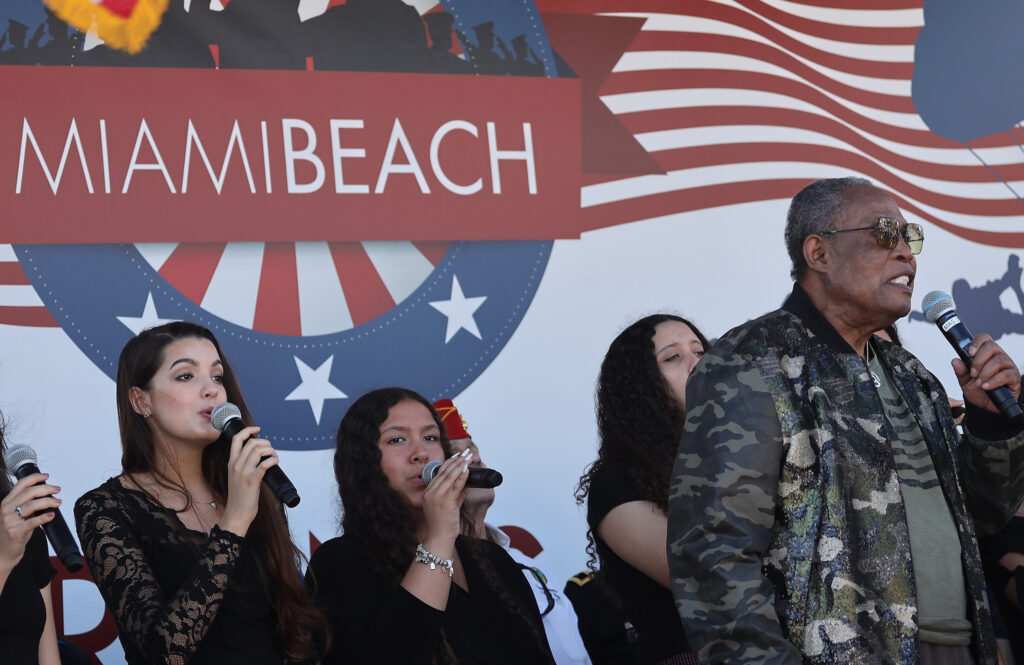Sam Moore, the towering tenor of the Sam & Dave soul music duo whose mid-1960s hits “Soul Man” and “Hold On, I’m Comin’ ” soundtracked the lives of countless fans and then heard in film and TV for generations, died Friday at a Miami hospital, his wife, Joyce Moore, said.
Moore, who was born in Miami’s Overtown neighborhood on Oct. 12, 1935, was 89.
His career took him from public grade schools and churches in Miami where he’d forge the gospel soul into his voice to please his mother, Louise Robinson, to a small club stage in Liberty City where he discovered the “& Dave” musical partner that would forever be part of his name.

International fame took Moore around the world for decades, but he came home again about 10 years ago to inspire the next generation of Miami kids at his old schools and at Florida International University through his gifts of music and his time.
Moore had surgery for a spinal compression on Tuesday, three days earlier. He was recovering and was to start rehabilitation Friday morning, his wife said. But as the rehab center called Joyce about Sam’s appointment, she had to interrupt the caller to break the news from a Coral Gables hospital room. Moore wasn’t going to rehab this day.
“I’m trying to have a sense of humor,” she told the Miami Herald Friday night. “You know that saying with Amy Winehouse some years ago where she said, ‘No, no, no’ about going to rehab? He took that to heart. ‘No, no, no.’”
Samuel David Moore inspired an array of emotions. He bridged worlds personally, musically, culturally and geographically.

Moore sang for six United States presidents — Jimmy Carter, George H.W. Bush, Bill Clinton, George W. Bush, Barack Obama and Donald Trump.
He and Joyce were invited guests for the state funeral for the senior President Bush at the Washington National Cathedral in 2018. The Moores and George and Barbara Bush were friends for more than 30 years, exchanging personal letters and invitations, after Moore sang at Bush’s inauguration in 1989 at an event his wife co-produced.
“What comes to mind is that I look at it as coming from a humble beginning,” Sam Moore told the Miami Herald after the funeral service where he and his wife sat with the surviving presidents at the cathedral.
“To have met, and been around, and shared a frontal position with presidents, queens, princesses, prince, special people, that we didn’t walk the same streets together, it tells me, I guess, my voice said a lot,” Moore said when he returned to Miami from the service. “It’s humbling and gracious and I do not take that lightly. … I gotta tell you I am humble to the point of saying, “Wow.’”
Nearly 60 years earlier, Moore, the only Miami-born artist to make it into the national Rock and Roll Hall of Fame, was hosting a talent show at the King of Hearts club at 6000 NW Seventh Ave. in Miami’s Liberty City in 1961. There, he met a nervous aspiring gospel singer, Dave Prater, struggling on stage. Moore, who had similar musical roots and ambitions, recognized talent, and helped his future musical partner remember the words to a song and get through his performance.

The two quickly worked up an act.
Moore’s voice inspired a young University of Miami pre-med student to chuck his scrubs and classrooms for a career as a full-time songwriter and producer. That young man, Steve Alaimo, discovered the unknown Sam & Dave in 1961 at the King of Hearts, both Sam and Joyce Moore said in December when Alaimo died at 84.
Alaimo, in his early ‘20s, was electrified by the duo on stage. He saw star quality in Moore’s aching, swooping tenor and Prater’s gruff baritone. He produced and co-wrote the recordings that helped Sam & Dave score major label deals with Stax, a landmark R&B/soul label out of Memphis, and New York-based Atlantic Records that called North Miami’s Criteria Studios its Southern hub.
Bruce Springsteen thought Moore was boss decades after career setbacks and drug addictions cratered the Sam & Dave musical partnership. Springsteen and Moore swapped vocals on each other’s records starting in the 1990s and were close. Prater died in 1988 at age 50 in a Georgia car crash.
“Sam & Dave were gigantic in my musical development,” Springsteen said on “Late Night With Seth Myers” in 2022. “What most people don’t understand is that Sam Moore was an incredible band leader. He’s a great guy and probably our greatest living soul singer.”
Listen to the early Sam & Dave singles Moore cut with Georgia-born Prater. There’s the wrenching heartache and yearning baked into the oft-covered “When Something Is Wrong With My Baby” from 1966. The lusty abandon of that year’s “Hold On, I’m Comin’.” Then stream the lesser-known 1967 soul ballad, “I Can’t Stand Up for Falling Down,” a tune English rocker Elvis Costello covered and rearranged in 1980 as a rave-up.
“That’s a really beautiful performance,” said former Miami Herald pop music critic and retired Pulitzer-winning columnist Leonard Pitts Jr. “It’s almost delicate, which is not a word you typically use with regard to Stax. Sam does this falsetto thing that’s just so pretty before going down into his normal tenor range.”
Late soul legend Isaac (“Shaft”) Hayes, who cowrote Sam & Dave’s biggest hits on Stax and Atlantic Records in the mid-1960s, including “Soul Man” and “I Thank You,” nicknamed Moore “Blessed One” because of his vocal gift, Joyce Moore said.
Can anyone of any age not smile when they think of John Belushi and Dan Aykroyd and their “Saturday Night Live” characters the Blues Brothers and their 1978 hit cover of “Soul Man?” Hollywood built an entire blockbuster comedy film around the Blues Brothers in the 1980 film of the same name.
Moore credited his wife with his personal and creative rebirth that eventually led him back home to Miami. Joyce, a Chicago-born University of Miami student in the early-1960s, had serious management cred in the music industry, managing the late singer-keyboardist Billy Preston, and she took control of Sam’s career after they married in 1982. She got him off drugs.
The years after the first Sam & Dave split in 1970 were rough.
Moore’s promising solo debut on Atlantic, “Plenty Good Lovin’,” was recorded through 1970 with luminaries like producer and saxophonist King Curtis and guest musicians Aretha Franklin and Donny Hathaway. But Atlantic shelved the album soon after Curtis was murdered on the steps of his Manhattan apartment in 1971. The album was finally released in 2002.
At the time of Miami Beach’s Centennial celebration in 2015, the Moores moved back to Miami from Scottsdale, Arizona. They had a home in Coral Gables until his death.
That was another bridge Moore gulfed.
“Well, as Jon Bon Jovi said, ‘Who Says You Can’t Go Home?’ And the truth is Sam was more than able to come home. He was embraced. He wound up the artist in residence at Florida International University, which he was serving as now. Even at the time of his death and his passing, he was totally and thoroughly thrilled to be home and realized it was the best thing he ever did coming back to Miami,” Joyce said.
Moore was raised in a house on Third Avenue in Overtown mostly by his mom, a schoolteacher. He went to Phillis Wheatley and Paul Laurence Dunbar elementary schools in Miami. He briefly lived with an aunt in Fort Lauderdale where he attended Dillard High School. Moore graduated from Booker T. Washington Senior High in Overtown in 1955.
“It was wonderful in those days,” Moore told the Herald in 2002. “Miami, in the early 1950s, I didn’t know anything about segregation. Not until I got out there with Dave.”
Miami-Dade County Public Schools inducted Moore into its 2020 Alumni Hall of Fame.
In May 2022, Moore was the first recipient of The CARTA Medallion, created by FIU’s College of Communication, Architecture + The Arts and the Tonkinson Foundation, for his contributions to culture both locally and globally.
“His achievements, work ethic and advocacy for our community make him an exemplary model for our college,” FIU Dean Brian Schriner said at the time.
Moore and his wife started music programs at Wheatley and Dunbar, the two public elementary schools he attended. He was chosen grand marshal for the Miami Beach Veteran’s Day Parade in 2019.
“And this was something Sam never thought he would do,” Joyce said on Friday. “But it all worked out. It was just right.”
Leonard Pitts marvels at Moore’s musical reach extending from Memphis to Miami.
“Sam & Dave were the epitome of the Southern soul sound. And it’s funny, because even though Sam was a Miami product, he didn’t epitomize what I always thought of as the Miami sound. It was Memphis through and through with the brawny horns and the really pungent, soulful sound,” Pitts said.
“And the thing that made Stax important was it stood as a juxtaposition, a counterbalance to Motown. Motown took what was R&B and it citified R&B. It was sweetened up and had elements of pop, which is why it had such broad crossover. Stax, with Sam & Dave, and then Isaac Hayes and Booker T. and Rufus and Carla, and all those folks, they weren’t interested in white crossover. It was like, ‘You’ll come to us. We’re not gonna change or sweeten or soften, or whatever, to compromise the sound in order for that to achieve that crossover.’ It was the rawest, roughest stuff on the radio for a while in the late-’60s and early-’70s and Sam was the avatar of that.”
At the time of his death, Moore was planning to go back into the studio with producer Rudy Perez in Nashville to finish an album project he was working on, Joyce Moore said.
“And then at 8:20 this morning, it wasn’t ever going to happen.”
In addition to his wife, Moore’s survivors include their daughter Michelle and grandchildren Tash and Misha.









